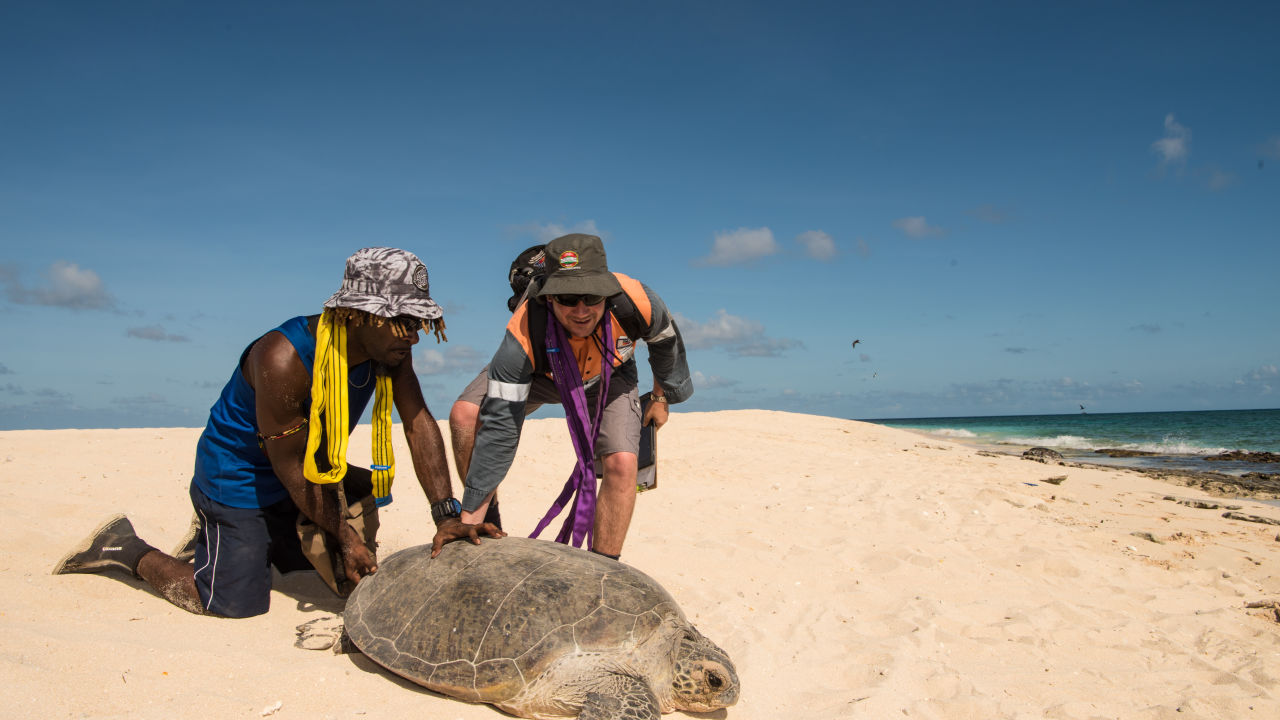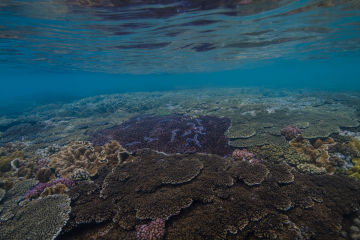Media Release ·
Turtles tracked on Raine Island to further protect species
Raine Island Recovery Project

The Palaszczuk Government is continuing to protect vulnerable green turtles as part of the $7.95 million Raine Island Recovery Project, which has fitted 21 green turtles with satellite trackers so far this season.
Minister for Environment and the Great Barrier Reef Leeanne Enoch said this year’s Raine Island Recovery Project was now well underway.
“Raine Island is the world’s largest known rookery for the green turtle and this area supports the largest breeding population of green turtles in Queensland,” Ms Enoch said.
“Significant research and monitoring programs are undertaken on the Island to help protect these creatures.
“Last year, more than 20,000 cubic metres of sand was re-profiled on Raine Island to give turtles and their eggs the best chance of survival. Nineteen turtles were also tagged during last year’s conservation efforts.
“This year, researchers have successfully fitted another 21 female green turtles with satellite trackers, which will help us better understand the nesting patterns of green turtles at Raine Island.”
Ms Enoch said research will help analyse how last year’s work on sand dunes is improving the turtles’ nesting success.
“The Raine Island Recovery Project is a collaborative project involving James Cook University (JCU), rangers from Queensland Parks and Wildlife Service (QPWS) and Wuthathi and Kemerkemer Meriam Nation (Ugar, Mer, Erub) Traditional Owners.”
Associate Professor and senior lecturer at JCU Dr Mark Hamann one of the turtles tagged this trip was first observed on Raine Island in 1987.
“Since 1987, this turtle has been back to Raine five times – 1991, 1995, 1999, 2006 and 2018,” Dr Hamann said.
“Satellite tracking gives us incredible insight into their behaviour and it becomes quite addictive to login each day and see what they have been up to.
“We expect the turtles to hang around Raine for a few months, laying a clutch of eggs each fortnight, before they begin their migrations home.
“The movement of some of the tagged turtles can also be followed online at Seaturtle.org. which can be quite interesting to watch from around January and February when the turtles begin migrating to their feeding grounds.”
Minister Enoch said a number of the tagged turtles had been named by Reef Guardian schools and Traditional Owners.
“The names chosen include Summer, Mango, Sugar, Happy Questa, Tokolu and UME (Ugar, Mer, Erub – the Kemerkemer Meriam Nation islands),” Ms Enoch said.
“Facebook users also have the opportunity to name one of the turtles from today by logging onto the QPWS Facebook page and suggesting a name.”
The Raine Island Recovery Project is five-year, $7.95 million collaboration between the Palaszczuk Government, the Great Barrier Reef Marine Park Authority, the Wuthathi Nation and the Kemerkemer Meriam Nation (Ugar, Mer, Erub) Traditional Owners, Great Barrier Reef Foundation and BHP.
Great Barrier Reef Foundation Managing Director Anna Marsden said the ability to fund a large number of satellite tags and a dedicated turtle nesting research component through the project was critical to Raine Island’s future.
“The focus this year is firmly on turtle nesting behaviour as this is vital to the ongoing sustainability of Raine Island, the world’s largest remaining green turtle rookery.
“We need to give researchers every possible advantage as they work to increase the resilience of the island which is essential to the survival of our northern green turtles and many other precious species.”
BHP Mitsubishi Alliance Asset President James Palmer said the challenges facing the Reef are such that no one group can solve its problems alone, and collaboration, leadership and strong drive for innovation is required.
“Through our long term commitment to the Raine Island Recovery Project, BHP and its partners are working together to help build the resilience of the Great Barrier Reef for future generations,” Mr Palmer said.
Video footage taken during the season’s first trip and examples of the satellite tracking of some of the turtles can be viewed here.




